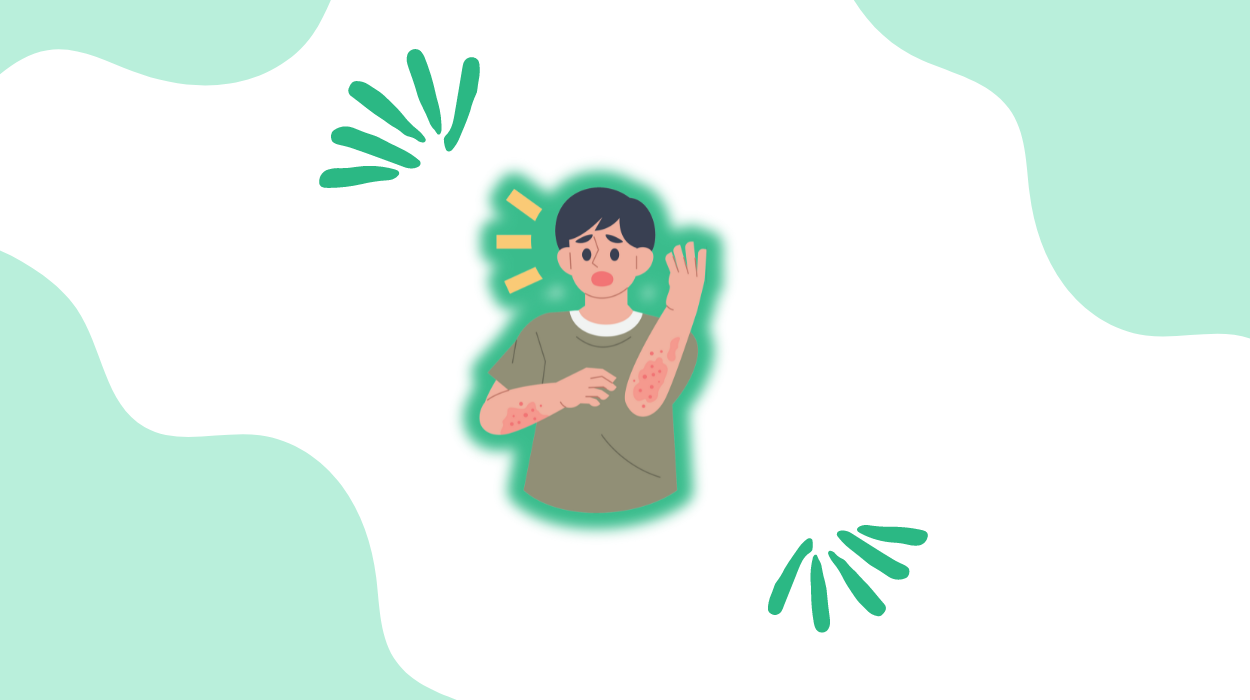

Uncomfortable sensations in your skin, like a burning sensation or crawling, can hinder your normal day-to-day life. Skin crawling may also be called formication, paresthesia, or neuropathic itch.
Formication could make you hallucinate about insects crawling under your skin. It could be due to various underlying conditions like cognitive impairment, chronic disease, etc. Skin crawling might lead to skin damage, aches, and skin agitation.
While skin crawling happens unexpectedly, learning about common causes of skin crawling and how it could be treated may help you get timely medical attention and avoid certain dangerous health situations.
 Factors That Triggers The Skin Crawling Sensation
Factors That Triggers The Skin Crawling SensationMenopause marks the cessation of a woman’s reproductive years. It may bring about various skin changes due to fluctuating hormone levels.
Estrogen levels reduce during menopause, leading to changes in the skin’s structure and function. These hormonal fluctuations could contribute to sensations like skin crawling, where women feel as if bugs are crawling on or under their skin.
Menopause may induce heightened stress and anxiety in women, which may exacerbate skin-related sensations.
Psychological disorders could manifest in various ways and may contribute to sensations like formication. Conditions such as anxiety, schizophrenia, and delusional parasitosis could lead to sensations of bugs crawling on or under the skin.
Treatments like cognitive-behavioral therapy, medications, and stress reduction techniques may help manage psychological disorders, thereby also reducing the skin-crawling feeling.
Specific medications may cause various reactions, including a skin-crawling feeling in people taking medications prescribed for specific medical conditions. These side effects could vary in severity and type.
Some common medication side effects to be aware of include:
Recreational drug use poses significant risks to both physical and mental health, including the potential development of severe symptoms like formication.
Research highlights that substances such as methamphetamines and cocaine could trigger intense sensations of bugs crawling under the skin.
People struggling with addiction to these drugs may experience heightened formication during withdrawal phases, often accompanied by body pain.
Overcoming drug addiction and managing withdrawal under the guidance of a specialized therapist may aid in reducing skin crawling.
Formication experienced by people may often be attributed to various skin conditions that result from a highly reactive immune system triggering responses. These could include hives, scabies, and eczema.
Allergic reactions provoked by contact with specific allergens release histamine, which could induce itching.
Prolonged exposure to such conditions could result in dehydration and skin inflammation, leaving the body vulnerable to formication.
Recording unusual sensations in a diary could provide valuable insights for pinpointing these triggers. Addressing underlying conditions and identifying the root causes may help people reduce the pain and discomfort associated with formication.
Recognizing stress triggers, anxiety, medication use, hormonal changes, and dietary habits could also help in managing these skin-crawling sensations.
Practicing relaxation techniques may reduce the unsettling skin-crawling sensation. Meditation, deep breathing, and muscle relaxation may help calm the mind and reduce stress levels. Smart drugs and brain supplements could also help improve cognitive function.
| Relaxation Techniques | Description | Benefits |
|---|---|---|
| Meditate | Practice mindfulness to calm the mind and relax the body | Reduces stress and anxiety levels |
| Deep Breathing | Focus on deep, slow breaths to promote relaxation and oxygenation | Enhances oxygen flow and reduces tension |
| Muscle Relaxation | Systematically tense and relax muscle groups to release tension | Relieves physical and mental stress |
Hygiene plays a significant role in removing potential irritants from the environment. It may help reduce the cross-transmission of microorganisms. You could reduce your skin crawling breakout by trying simple hygiene methods like:
Skin care is important for maintaining healthy and comfortable skin. A milder, fragrance-free cleanser may help keep skin’s natural oil intact. Dermatologist-tested and trusted body oils could also help in moisturizing your skin.
Research has suggested that dry skin, also known as xeroderma, could worsen the crawling sensation. A gentle moisturizer that hydrates the body and maintains its natural barrier function is essential to prevent xeroderma.
Recreational drug use may worsen psychological withdrawal symptoms, including the sensation of bugs crawling under your skin.
Recreational drugs could significantly impact the body’s nervous system, leading to various sensations and symptoms like formication.
Discontinuing the use of such substances allows the body to readjust and recover. This may reduce the skin-crawling feeling.
Seeking professional support is recommended if quitting recreational drug use becomes challenging.
Diabetic neuropathy and Lyme disease may cause skin crawling and itching. It may give rise to severe health complications like:
Constant scratching due to the itching sensation associated with formication could result in cuts, scabs, and open wounds. Bacterial or viral infections from these complications may lead to:
Skin crawling caused by neurological conditions or the use of psychoactive substances like ecstasy may induce delusional parasitosis. This condition makes people believe that actual insects are crawling on them.
Accurately diagnosing the sensation of skin crawling includes assessing a range of factors, including accompanying symptoms, timing of sensations, medication history, and potential substance use.
People experiencing this sensation should provide detailed information on medications and symptoms noticed alongside the skin crawling to their doctor.
This comprehensive information helps doctors identify potential underlying conditions or medication reactions that could contribute to the skin-crawling sensation.
Healthcare providers also run other tests, like physical examinations and blood tests, to differentiate between formication symptoms and conditions like scabies, where tiny mites infest the skin.
Treatment options for skin crawling sensations vary depending on the underlying cause. They could involve a combination of medical interventions and lifestyle adjustments.
Lifestyle changes like quitting drugs and getting professional support may also prevent skin crawling. Consult a doctor who may help you guide you through the most appropriate treatment plan based on your condition.
There are many reasons that may cause formication or skin crawling. These may include menopause, psychological disorders, certain medications, or recreational drug abuse.
Identifying potential triggers, engaging in relaxation techniques, and avoiding recreational drugs may help you manage this distressing condition. It is also important to have good hygiene and a proper skincare routine to help prevent it.
Openly discussing symptoms with your doctor could help identify the cause and develop personalized treatment for skin crawling.
Tyler Read earned an undergraduate academic degree from Sonoma State University, California and is a certified personal trainer (CPT) with NASM (National Academy of Sports Medicine). With over 16 years of experience, Tyler has trained clients both online and in-person.
He is passionate about helping others turn their love for fitness into a career. Tyler has worked with many local and commercial gyms before establishing his successful private personal training business, which he continues to operate.
